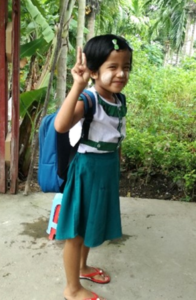Support the Montessori Preschools in Myanmar
Funds raised so far: 79%
PRESENTATION OF THE PROJECT
The project to support Montessori preschools in Myanmar began in 2020. The project was set up in response to several requests from the Good Shepherd Sisters, to perpetuate their work in the regions of Techileik, Magyikwin, Hopin, Dala and Loikaw. This is the fourth year of support for 770 preschool children.
The sisters have several objectives for the preschool children. Firstly, provide child care to enable parents to work. Secondly, to prepare children for primary school by giving them the basics of life in a community and the school curriculum: the Sisters use the Montessori method and offer all these young children an excellent framework for early learning and preparation for primary school. And finally, to guarantee the children complete and balanced meals every day.
THANK YOU for your help and support!
THE STRENGTHS OF THE PROJECT
- The nursery school system is sustainable and the teachers are qualified and paid.
- The children benefit from an innovative learning method that encourages initiative, imagination, and reflection, preparing them to enter primary school with confidence. This method compensates for the shortcomings of the Burmese school system, which is based on repetition and does not rely on the pupil’s understanding.
- Children are looked after and not left to fend for themselves while their parents work.
THE CONTEXT AND THE NEEDS
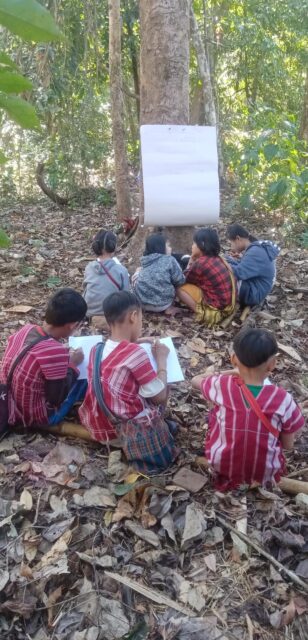
Since 2021, civilians in the targeted areas have been affected by the country’s multidimensional crisis. There is no judicial system of administration and governance for the public. The consequences of the political crisis have left innocent civilians homeless, displaced, dead and suffering human rights and child rights violations. The military is using heavy weapons, and villages are being burnt down. Priority is given to places where PDFs (People Defence Forces) are likely to be hiding, i.e. schools and churches.
According to data published by OCHA in February 2023, more than 1.6 million people, including children, are displaced as a result of previous and current conflicts.
Prices are rising steadily (by a factor of 2 to 3 in outlying areas). Commercial activities have been curtailed, imports are no longer officially authorised, parallel trafficking is on the increase, and electricity problems are worsening, preventing people from working.
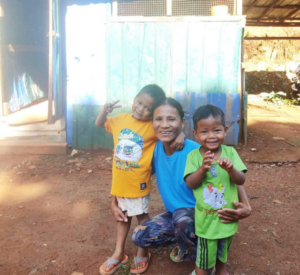 Children are particularly hard hit by the lack of access to education. They are often denied access to school because of inadequate learning spaces, bureaucratic problems or security concerns. Enrolment rates have been falling since 2021, and parents and children are unwilling to cooperate with the de facto authorities.
Children are particularly hard hit by the lack of access to education. They are often denied access to school because of inadequate learning spaces, bureaucratic problems or security concerns. Enrolment rates have been falling since 2021, and parents and children are unwilling to cooperate with the de facto authorities.
Children who can afford private education attend public schools, while those who cannot afford it rely on the online distance learning system. Despite this, there are still children who do not have access to education. The Good Shepherd Sisters hope to support the most vulnerable groups of children by offering community learning corners.
The needs remain the same as in previous years: food for the children, teachers’ salaries, learning kits and hygiene kits. The number of beneficiaries is increasing (770 instead of 500 last year). 42 teachers will be supported.
Five locations in Myanmar
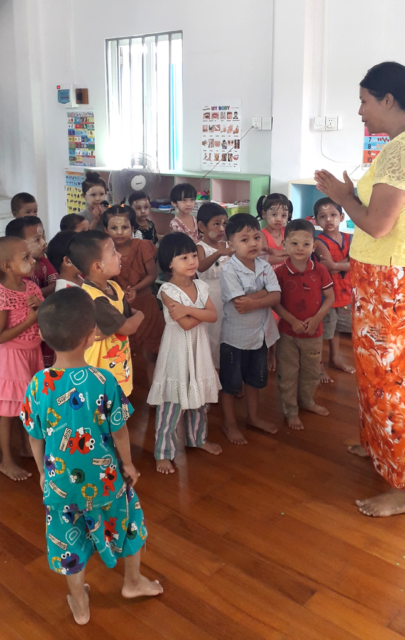 This is a collaborative project involving parents, church leaders and local people, which is helping to change attitudes.
This is a collaborative project involving parents, church leaders and local people, which is helping to change attitudes.
The budget will cover food, teachers’ salaries and home learning equipment to ensure that the children receive a good education. Thanks to these measures, those in charge will be able to continue meeting parents. There will be a monthly evaluation with parents and teachers. The monitoring and control programme will often be carried out by the nun in charge.
Tachileik: is located in a “risk zone” where a lot of trafficking takes place (prostitution, drugs and organ trafficking). It’s not easy for young people to stay motivated in their studies, especially the boys. They are easily influenced and tempted to earn easy money. The Sisters have set up three kindergartens in three different villages. The planned educational programme focuses on 50 children and 3 teachers.
Magyikwin: this region is suffering greatly from the conflicts resulting from the coup d’état. Many children help their parents and work in their spare time (building roads, doing fieldwork, etc.). As a result, parents do not send their children to school and an “at home” education has developed. The children are divided into small groups in the homes during the day, and it is the educators who travel. The project has been a great success and everyone wants to continue it. There will be 8 teachers for 120 children.
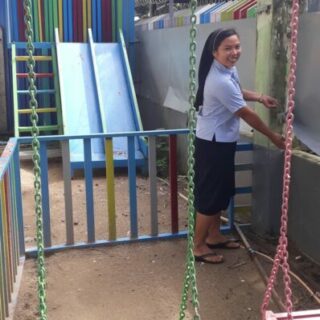 Hopin: because of the pandemic and the coup, the schools have been closed for two years and there are very few opportunities to attend. To combat school drop-out and all the evils of society (drugs, child labour, early marriages, etc.), the nuns have set up summer courses, online English courses, study guides and home learning, which are very effective for the children. The programme will take care of 120 children with the help of 10 teachers.
Hopin: because of the pandemic and the coup, the schools have been closed for two years and there are very few opportunities to attend. To combat school drop-out and all the evils of society (drugs, child labour, early marriages, etc.), the nuns have set up summer courses, online English courses, study guides and home learning, which are very effective for the children. The programme will take care of 120 children with the help of 10 teachers.
Dala: is a shanty town, one of the poorest in Yangon Division. This programme gives the children access to school and provides them with a basis for their lives. The Good Shepherd Sisters have introduced the Montessori method because of its positive impact on children and parents, in particular by instilling moral values, rules of hygiene, etc. The programme will cater for 50 children and 3 teachers.
Loikaw: while many preschools had to close because of the coup and transform the programme into a home school, the centre in the village of Khonmon remained open. The preschool will cater for 450 children. It is supervised by Sister Felicitas, who will be assisted by 18 teachers.
The Montessori preschool programme supports 770 children in five locations, most of whom are from internally displaced families.
After two years of closure, the schools have officially reopened, but few children have returned. In state schools, which make up the vast majority of schools, many teachers are still on strike and parents are afraid to let their children return to school.
This Montessori preschool programme is a way of giving these children access to the best so that they can grow up with peace of mind.
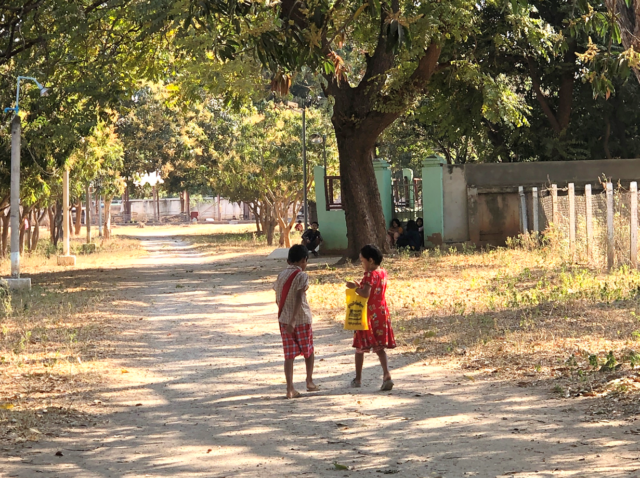
If you are a US taxpayer, click here to donate.

